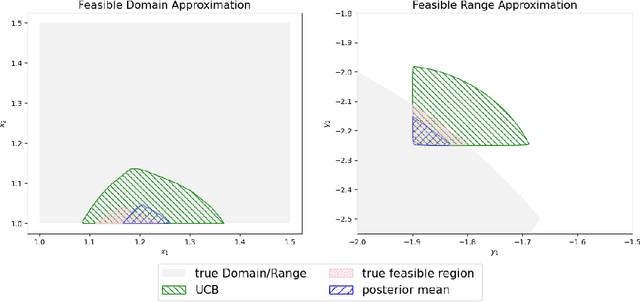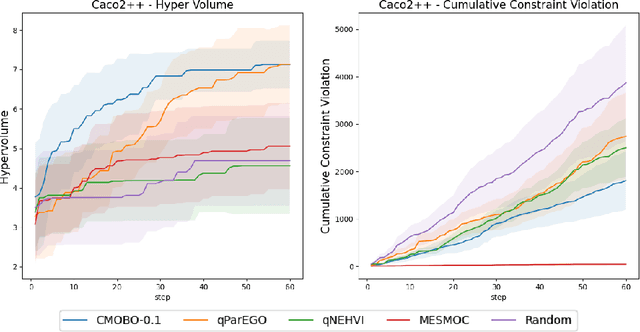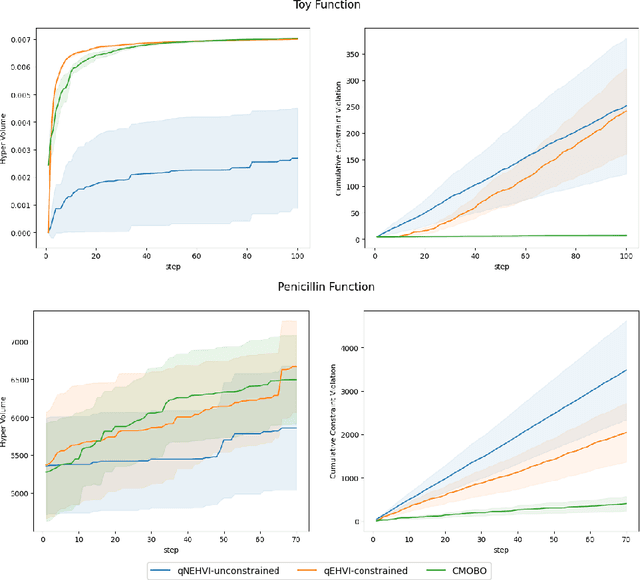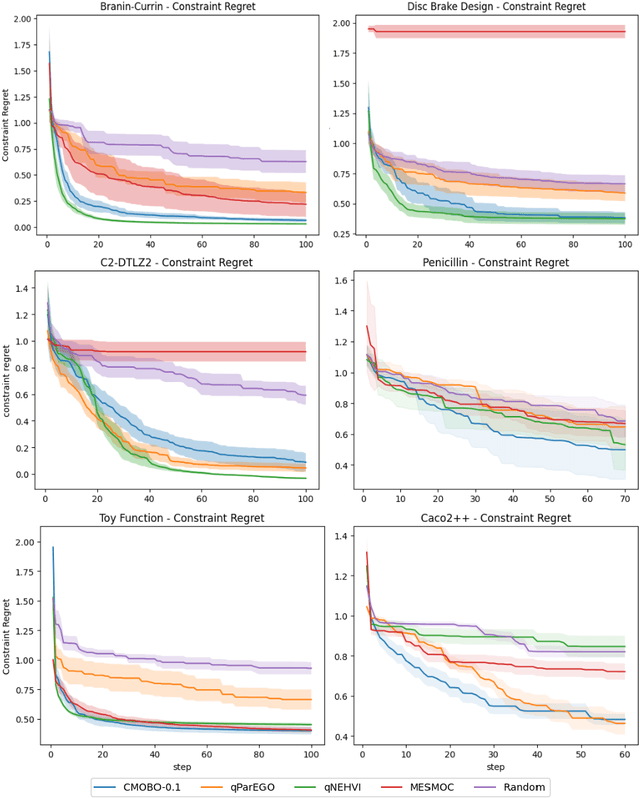Fengxue Zhang
Direct Regret Optimization in Bayesian Optimization
Jul 09, 2025Abstract:Bayesian optimization (BO) is a powerful paradigm for optimizing expensive black-box functions. Traditional BO methods typically rely on separate hand-crafted acquisition functions and surrogate models for the underlying function, and often operate in a myopic manner. In this paper, we propose a novel direct regret optimization approach that jointly learns the optimal model and non-myopic acquisition by distilling from a set of candidate models and acquisitions, and explicitly targets minimizing the multi-step regret. Our framework leverages an ensemble of Gaussian Processes (GPs) with varying hyperparameters to generate simulated BO trajectories, each guided by an acquisition function chosen from a pool of conventional choices, until a Bayesian early stop criterion is met. These simulated trajectories, capturing multi-step exploration strategies, are used to train an end-to-end decision transformer that directly learns to select next query points aimed at improving the ultimate objective. We further adopt a dense training--sparse learning paradigm: The decision transformer is trained offline with abundant simulated data sampled from ensemble GPs and acquisitions, while a limited number of real evaluations refine the GPs online. Experimental results on synthetic and real-world benchmarks suggest that our method consistently outperforms BO baselines, achieving lower simple regret and demonstrating more robust exploration in high-dimensional or noisy settings.
A Machine Learning Approach Capturing Hidden Parameters in Autonomous Thin-Film Deposition
Nov 27, 2024



Abstract:The integration of machine learning and robotics into thin film deposition is transforming material discovery and optimization. However, challenges remain in achieving a fully autonomous cycle of deposition, characterization, and decision-making. Additionally, the inherent sensitivity of thin film growth to hidden parameters such as substrate conditions and chamber conditions can compromise the performance of machine learning models. In this work, we demonstrate a fully autonomous physical vapor deposition system that combines in-situ optical spectroscopy, a high-throughput robotic sample handling system, and Gaussian Process Regression models. By employing a calibration layer to account for hidden parameter variations and an active learning algorithm to optimize the exploration of the parameter space, the system fabricates silver thin films with optical reflected power ratios within 2.5% of the target in an average of 2.3 attempts. This approach significantly reduces the time and labor required for thin film deposition, showcasing the potential of machine learning-driven automation in accelerating material development.
Constrained Multi-objective Bayesian Optimization through Optimistic Constraints Estimation
Nov 06, 2024



Abstract:Multi-objective Bayesian optimization has been widely adopted in scientific experiment design, including drug discovery and hyperparameter optimization. In practice, regulatory or safety concerns often impose additional thresholds on certain attributes of the experimental outcomes. Previous work has primarily focused on constrained single-objective optimization tasks or active search under constraints. We propose CMOBO, a sample-efficient constrained multi-objective Bayesian optimization algorithm that balances learning of the feasible region (defined on multiple unknowns) with multi-objective optimization within the feasible region in a principled manner. We provide both theoretical justification and empirical evidence, demonstrating the efficacy of our approach on various synthetic benchmarks and real-world applications.
No-Regret Learning of Nash Equilibrium for Black-Box Games via Gaussian Processes
May 14, 2024



Abstract:This paper investigates the challenge of learning in black-box games, where the underlying utility function is unknown to any of the agents. While there is an extensive body of literature on the theoretical analysis of algorithms for computing the Nash equilibrium with complete information about the game, studies on Nash equilibrium in black-box games are less common. In this paper, we focus on learning the Nash equilibrium when the only available information about an agent's payoff comes in the form of empirical queries. We provide a no-regret learning algorithm that utilizes Gaussian processes to identify the equilibrium in such games. Our approach not only ensures a theoretical convergence rate but also demonstrates effectiveness across a variety collection of games through experimental validation.
Constrained Bayesian Optimization with Adaptive Active Learning of Unknown Constraints
Oct 12, 2023Abstract:Optimizing objectives under constraints, where both the objectives and constraints are black box functions, is a common scenario in real-world applications such as scientific experimental design, design of medical therapies, and industrial process optimization. One popular approach to handling these complex scenarios is Bayesian Optimization (BO). In terms of theoretical behavior, BO is relatively well understood in the unconstrained setting, where its principles have been well explored and validated. However, when it comes to constrained Bayesian optimization (CBO), the existing framework often relies on heuristics or approximations without the same level of theoretical guarantees. In this paper, we delve into the theoretical and practical aspects of constrained Bayesian optimization, where the objective and constraints can be independently evaluated and are subject to noise. By recognizing that both the objective and constraints can help identify high-confidence regions of interest (ROI), we propose an efficient CBO framework that intersects the ROIs identified from each aspect to determine the general ROI. The ROI, coupled with a novel acquisition function that adaptively balances the optimization of the objective and the identification of feasible regions, enables us to derive rigorous theoretical justifications for its performance. We showcase the efficiency and robustness of our proposed CBO framework through empirical evidence and discuss the fundamental challenge of deriving practical regret bounds for CBO algorithms.
Learning Regions of Interest for Bayesian Optimization with Adaptive Level-Set Estimation
Jul 25, 2023Abstract:We study Bayesian optimization (BO) in high-dimensional and non-stationary scenarios. Existing algorithms for such scenarios typically require extensive hyperparameter tuning, which limits their practical effectiveness. We propose a framework, called BALLET, which adaptively filters for a high-confidence region of interest (ROI) as a superlevel-set of a nonparametric probabilistic model such as a Gaussian process (GP). Our approach is easy to tune, and is able to focus on local region of the optimization space that can be tackled by existing BO methods. The key idea is to use two probabilistic models: a coarse GP to identify the ROI, and a localized GP for optimization within the ROI. We show theoretically that BALLET can efficiently shrink the search space, and can exhibit a tighter regret bound than standard BO without ROI filtering. We demonstrate empirically the effectiveness of BALLET on both synthetic and real-world optimization tasks.
Learning Representation for Bayesian Optimization with Collision-free Regularization
Mar 16, 2022



Abstract:Bayesian optimization has been challenged by datasets with large-scale, high-dimensional, and non-stationary characteristics, which are common in real-world scenarios. Recent works attempt to handle such input by applying neural networks ahead of the classical Gaussian process to learn a latent representation. We show that even with proper network design, such learned representation often leads to collision in the latent space: two points with significantly different observations collide in the learned latent space, leading to degraded optimization performance. To address this issue, we propose LOCo, an efficient deep Bayesian optimization framework which employs a novel regularizer to reduce the collision in the learned latent space and encourage the mapping from the latent space to the objective value to be Lipschitz continuous. LOCo takes in pairs of data points and penalizes those too close in the latent space compared to their target space distance. We provide a rigorous theoretical justification for LOCo by inspecting the regret of this dynamic-embedding-based Bayesian optimization algorithm, where the neural network is iteratively retrained with the regularizer. Our empirical results demonstrate the effectiveness of LOCo on several synthetic and real-world benchmark Bayesian optimization tasks.
 Add to Chrome
Add to Chrome Add to Firefox
Add to Firefox Add to Edge
Add to Edge